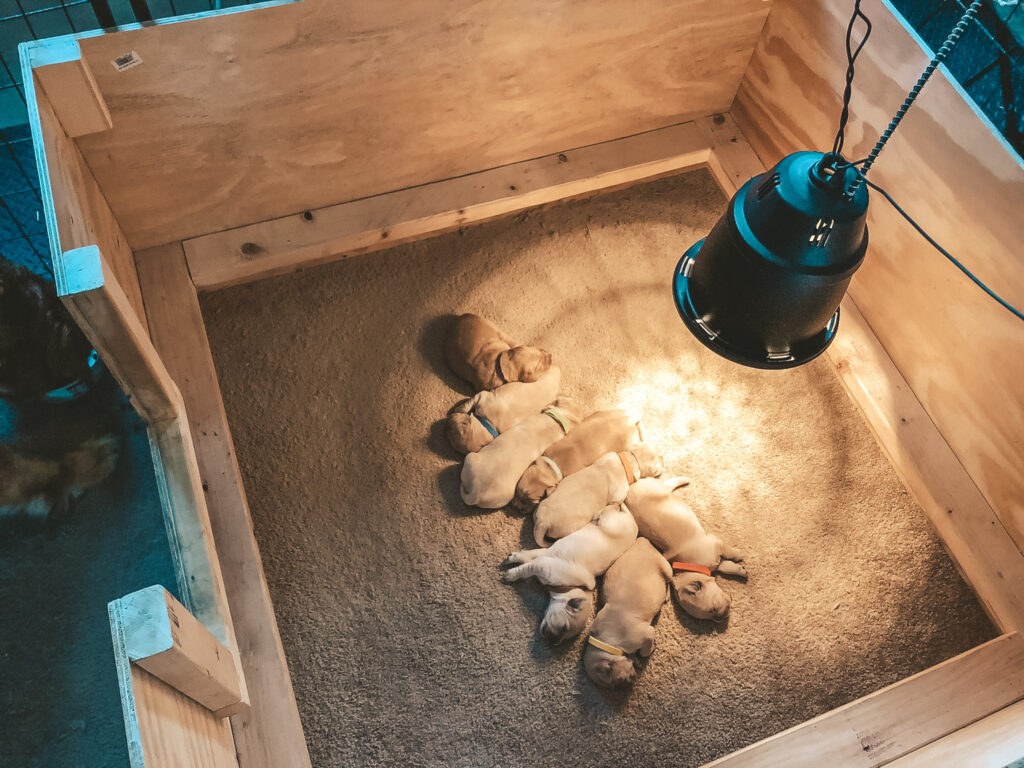Sleepless Nights: Newborn Puppies Crying At Night – Discover How To Help And Soothe Them!
Newborn Puppies Crying at Night: Understanding the Reasons and Finding Solutions
Introduction
Hello, Puppies Lover! Are you struggling with your newborn puppies crying at night? Don’t worry, you’re not alone. Many dog owners face this common issue when welcoming a new litter into their homes. In this article, we will explore the reasons why newborn puppies cry at night and provide you with useful tips to help you and your furry friends get a good night’s sleep.
3 Picture Gallery: Sleepless Nights: Newborn Puppies Crying At Night – Discover How To Help And Soothe Them!



Now, let’s dive into the world of newborn puppies and understand their crying behavior at night.
What Makes Newborn Puppies Cry at Night?

Image Source: timeincuk.net
🔍 Newborn puppies cry at night due to various reasons, including:
1. Hunger: Just like human babies, newborn puppies need to be fed frequently. Their small stomachs cannot hold much food, so they often wake up crying when they’re hungry.

Image Source: letsbringdoggo.com
2. Discomfort: Being separated from their mother and littermates can cause anxiety and discomfort for newborn puppies, leading to crying at night.
3. Temperature: Puppies are more sensitive to temperature changes compared to adult dogs. If they feel too hot or too cold, they may cry to express their discomfort.

Image Source: breedingbusiness.com
4. Need for Elimination: Newborn puppies have limited bladder and bowel control. They may cry at night when they need to urinate or defecate.
5. Loneliness: Puppies are social animals and crave companionship. Being alone in a new environment can make them feel lonely and result in night-time crying.
6. Fear: Newborn puppies are still adjusting to their surroundings and may feel scared in a new environment. This fear can manifest as crying at night.
Understanding these reasons is crucial in finding appropriate solutions to help your puppies feel safe and comfortable.
Who Experiences Newborn Puppies Crying at Night?
🐶 Newborn puppies, as well as their owners, experience crying at night. This behavior is common in puppies up to 12 weeks of age. As a responsible dog owner, it’s essential to address their needs and ensure their well-being.
Additionally, owners often find it challenging to sleep through the night when their puppies cry, leading to sleep deprivation and exhaustion. By understanding the causes and implementing appropriate strategies, both puppies and owners can enjoy a peaceful night’s rest.
When Do Newborn Puppies Cry at Night?
⏰ Newborn puppies tend to cry at night during the first few weeks of their lives. This is a crucial period for their development, and their cries serve as a way to communicate their needs to their mother and humans around them.
It’s important to note that puppies have different sleep patterns compared to adult dogs. They sleep in short bursts throughout the day and night, waking up frequently to eat and relieve themselves. This sleep-wake cycle contributes to their crying at night.
Where Do Newborn Puppies Cry at Night?
🌙 Newborn puppies cry wherever they are kept during the night, whether it’s in a cozy whelping box or a designated area in your home. It’s crucial to provide them with a comfortable and safe sleeping environment to minimize crying.
Creating a warm and secure space for your puppies can help alleviate their anxiety and reduce night-time crying. Make sure the area is free from drafts, has soft bedding, and is easily accessible for feeding and cleaning.
Why Do Newborn Puppies Cry at Night?
❓ Newborn puppies cry at night for several reasons:
1. Survival Instinct: Crying is a natural instinct for puppies to ensure their needs are met, such as food, warmth, and protection.
2. Communication: Puppies rely on crying to communicate with their mother and littermates, signaling their presence and requesting attention.
3. Developmental Milestones: Crying is a part of puppies’ early development, helping them learn and adapt to their environment.
4. Emotional Needs: Puppies have emotional needs and require love, comfort, and companionship. Crying at night can be a result of these unmet needs.
Understanding the underlying reasons behind their cries can help you address their needs effectively and create a harmonious environment for you and your puppies.
How to Deal with Newborn Puppies Crying at Night?
🔧 When faced with newborn puppies crying at night, here are some helpful strategies:
1. Establish a Routine: Create a consistent schedule for feeding, potty breaks, and playtime. This routine will help your puppies feel secure and understand what to expect.
2. Provide Comfort: Use a warm blanket or a snuggle toy to simulate the presence of their mother and littermates. This can help ease their anxiety and provide comfort during the night.
3. Proper Feeding: Ensure your puppies are getting enough nourishment during the day to minimize hunger cries at night. Consult your veterinarian for appropriate feeding guidelines.
4. Calming Environment: Create a quiet and soothing atmosphere in the sleeping area. Use white noise machines or soft music to drown out external sounds that may disturb your puppies.
5. Gradual Separation: If your puppies are recently separated from their mother, gradually introduce them to their new sleeping area. Start by keeping them close to you and gradually move them to their designated spot.
Remember, patience and consistency are key when dealing with newborn puppies crying at night. With time, proper care, and lots of love, your puppies will grow into well-adjusted dogs.
Advantages and Disadvantages of Newborn Puppies Crying at Night
Advantages:
1. Survival Instinct: Crying helps puppies communicate their needs, ensuring their survival and well-being.
2. Developing Independence: By learning to self-soothe and adapt to their new environment, puppies develop independence and resilience.
Disadvantages:
1. Sleep Deprivation: Constant crying at night can lead to sleep deprivation for both puppies and owners, affecting overall well-being.
2. Stress and Anxiety: Frequent crying can cause stress and anxiety in puppies, hindering their emotional and physical development.
Frequently Asked Questions (FAQs)
Q1: How long will my newborn puppies cry at night?
A1: The duration of night-time crying can vary for each puppy. In general, it tends to decrease as they grow older and become more independent. Patience and proper care are essential during this phase.
Q2: Should I let my puppies cry it out at night?
A2: It’s important to attend to your puppies’ needs and not completely ignore their cries. However, gradually teaching them to self-soothe and develop independence is beneficial for their long-term well-being.
Q3: Can I use medication to stop my puppies from crying at night?
A3: It is not recommended to use medication without consulting a veterinarian. Most cases of night-time crying can be addressed through environmental adjustments, routine, and proper care.
Q4: Will comforting my puppies when they cry reinforce the behavior?
A4: Comforting your puppies when they cry helps fulfill their emotional needs and provides security. It does not reinforce the behavior but helps create a trusting bond between you and your puppies.
Q5: When should I seek professional help for my puppies’ night-time crying?
A5: If your puppies’ crying persists despite implementing appropriate strategies, it is advisable to consult a veterinarian or a professional dog behaviorist for further guidance.
Conclusion
In conclusion, newborn puppies crying at night is a common behavior that can be attributed to various factors such as hunger, discomfort, and loneliness. By understanding their needs and implementing appropriate strategies, you can help your puppies feel safe and secure during their early stages of development.
Remember to establish a routine, provide comfort, and create a calming environment for your puppies. Gradually, their night-time crying will decrease as they grow older and become more independent.
Now, armed with the knowledge provided in this article, you can ensure a peaceful night’s sleep for both you and your adorable furry friends.
Final Remarks
Disclaimer: The information provided in this article is based on general knowledge and should not replace professional advice. If you have concerns about your puppies’ health or well-being, please consult a veterinarian or a professional dog behaviorist for personalized guidance.
Remember, patience, love, and proper care are essential in raising happy and healthy puppies.
This post topic: Puppies



